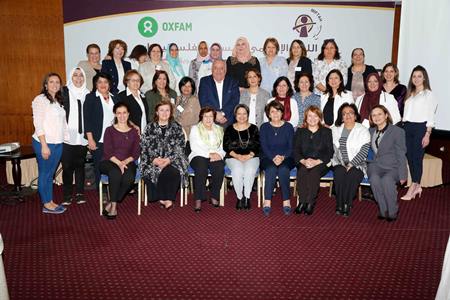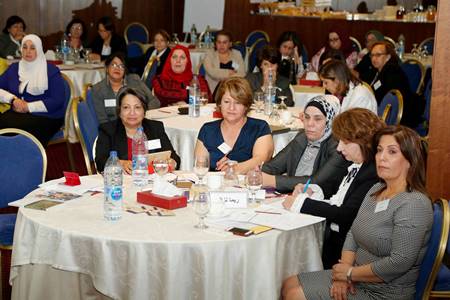|
MIFTAH meeting in Amman, Jordan Ramallah/Amman – MIFTAH, in coordination and cooperation with the Mezan Human Rights Center in Jordan completed the regional meeting for Palestinian women last week in Amman, entitled: “The Legal and National References of the Palestinian Women’s Agenda: priorities and interventions.” Palestinian women from inside the Green Line, the West Bank, Gaza Strip, the Diaspora; Syria, Lebanon, Egypt and Jordan all participated. Recommendations Women leaders and civil society representatives from Palestine and the Diaspora were unanimous on the need to work on a number of priorities within the women’s agenda . The participants confirmed the need to open dialogue spaces at the level of women’s groups and the General Union of Palestinian Women to rearrange and review their priorities and mechanisms for intervention in confronting the challenges facing the Palestinian cause in general and women in particular. They stressed on the need to review the Palestinian women’s rights document in light of the PA joining international human rights treaties and to invest national efforts towards aligning laws and legislations with relevant international agreements and resolutions. They also reaffirmed the need to push for a unifying women’s discourse based on a uniting national and women’s identity, in addition to putting women’s movement issues in order including its relationship with popular platforms. The participants called for expanding relevant networks and coalitions to include Palestinian women everywhere, in addition to working on reviving the various coalitions formed to pressure for the amendment of the penal and personal status laws. This includes identifying priority articles in need of amendment and quick intervention for change, to put them before decision-makers, i.e. the President’s office, and to push for the publication of the CEDAW agreement in the official newspaper. The next level of recommendation reaffirmed the need to regulate action priorities in line with accelerating regional and international events and changes regarding the Palestinian cause, first and foremost the US administration’s decision to recognize Jerusalem as the capital of Israel and the efforts being made to eliminate the right of return and impose resettlement plans on our people. The recommendations reaffirmed the right of self-determination, stressing on the Palestinians’ fixed, inalienable and internationally recognized positions. The recommendations also reaffirmed the importance of national unity and on issuing an “exceptional” report that highlights the various violations against Palestinian women in occupied Palestine and in the Diaspora. This report would then be utilized in international forums to shed light on the issues of Palestinian women under occupation and in the Diaspora as a means of pressure to hold Israel accountable for its violations against Palestinian women and the hardships these women face in exile. The recommendations were part of discussions that took place on the second day of the meeting regarding the priorities of the Palestinian women’s agenda, both at the national and social levels. The first focus was on the priorities of the women’s movement in its political agenda and the mechanism for its participation in preserving the Palestinian national identity as a unifying framework for Palestinian women in occupied Palestine and in the Diaspora/exile. This was considered the focal point for national constants and Palestinian national action, focusing on the need to revive the PLO as the legitimate reference for all Palestinians everywhere. Meanwhile, the second focus was discussion of priorities and interventions of the women’s movement in its social agenda towards achieving justice and equality for women, in addition to ways of preserving women’s achievements in their struggle to obtain full citizens’ rights. On the first day, the meeting included a presentation on the legal framework of the social and political agenda for Palestinian women, which was developed out of several dialogue meetings in the West Bank and Gaza. The presentation shed light on the various issues of Palestinian women and showcased the exclusivity of their situations in their places of location, whether inside the Green Line, in the Gaza Strip, West Bank, Syria, Lebanon, Egypt or Jordan. The women testified to the complex nature in which they live and the forms of discrimination and racism from which they suffer as a result of their Palestinian identity first, and as women, second. This, they said, had an effect on the form of women’s political participation and the manifestation of their Palestinian identity, in addition to the various cultural legacies in their different locations. The meeting also included a presentation on the gaps and loopholes in enacted laws at the national level, shedding light on the efforts made by the women’s movement and civil society organizations in preserving the achievements of Palestinian women. The Jordanian experience was referenced in terms of pressuring and impacting decision-makers to amend laws and legislation pertaining to women and to achieving social justice, in addition to the impact of civil society institutions in creating a social movement capable of adopting women’s issues and creating pressure on decision-makers. This is in addition to investing in the media as a tool for pressuring members of parliament and officials in changing laws or legislation that directly impinge on women. This meeting is part of MIFTAH’s efforts , in fostering women’s dialogue circles, regarding necessary priorities and interventions for pushing for a practical women agenda for Palestinian women with broad representation, which would comprise the basis for a unifying women’s discourse and a compass for Palestinian women on reaffirming national constants and a unifying national identity. This, in turn, would constitute a foundation and references for drafting and harmonizing national laws and legislation in a way that would guarantee the promotion of Palestinian women’s participation and also safeguard the protection of their rights and liberties, based on national documents, human rights principles and relevant UN resolutions. The regional meeting is one of MIFTAH’s interventions implemented through its project “Conflict and Fragility” and funded by OXFAM which aims to enhance women’s participation in advancing women peace and security agenda.


http://www.miftah.org |